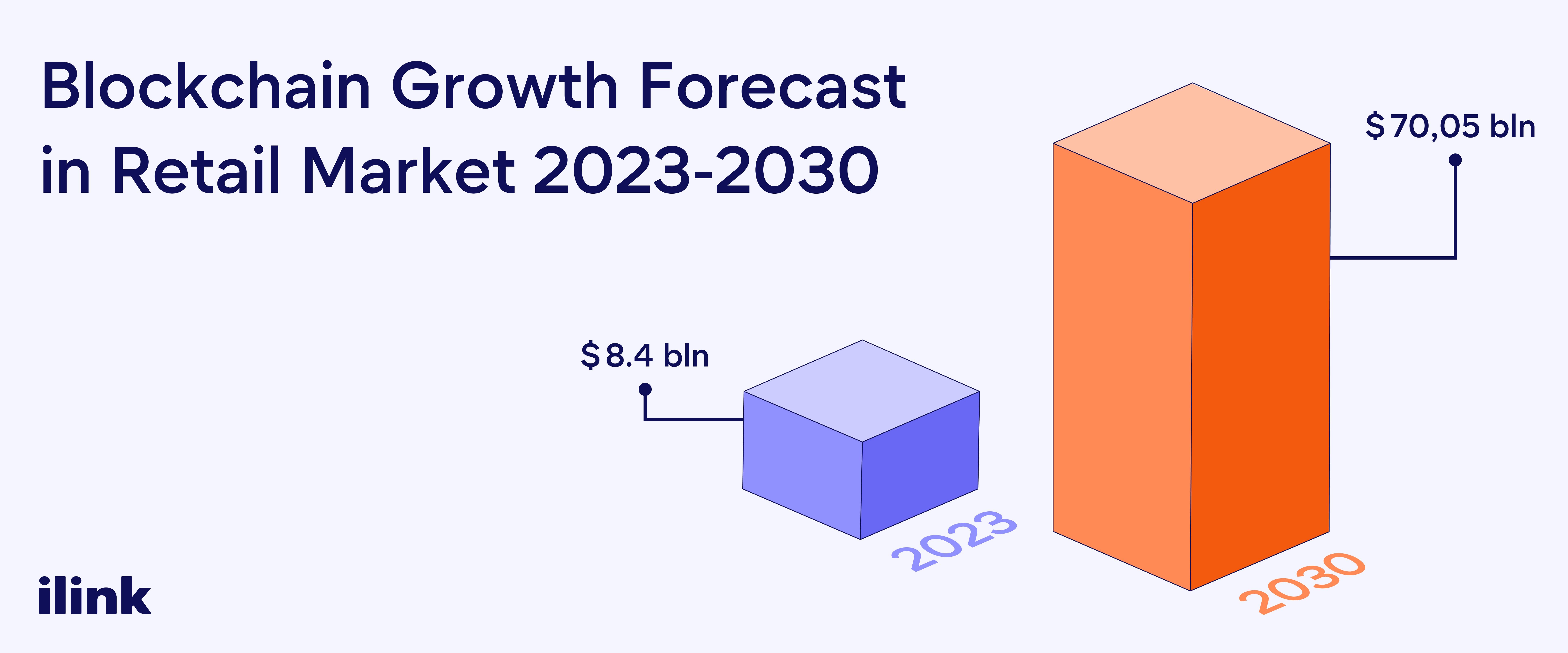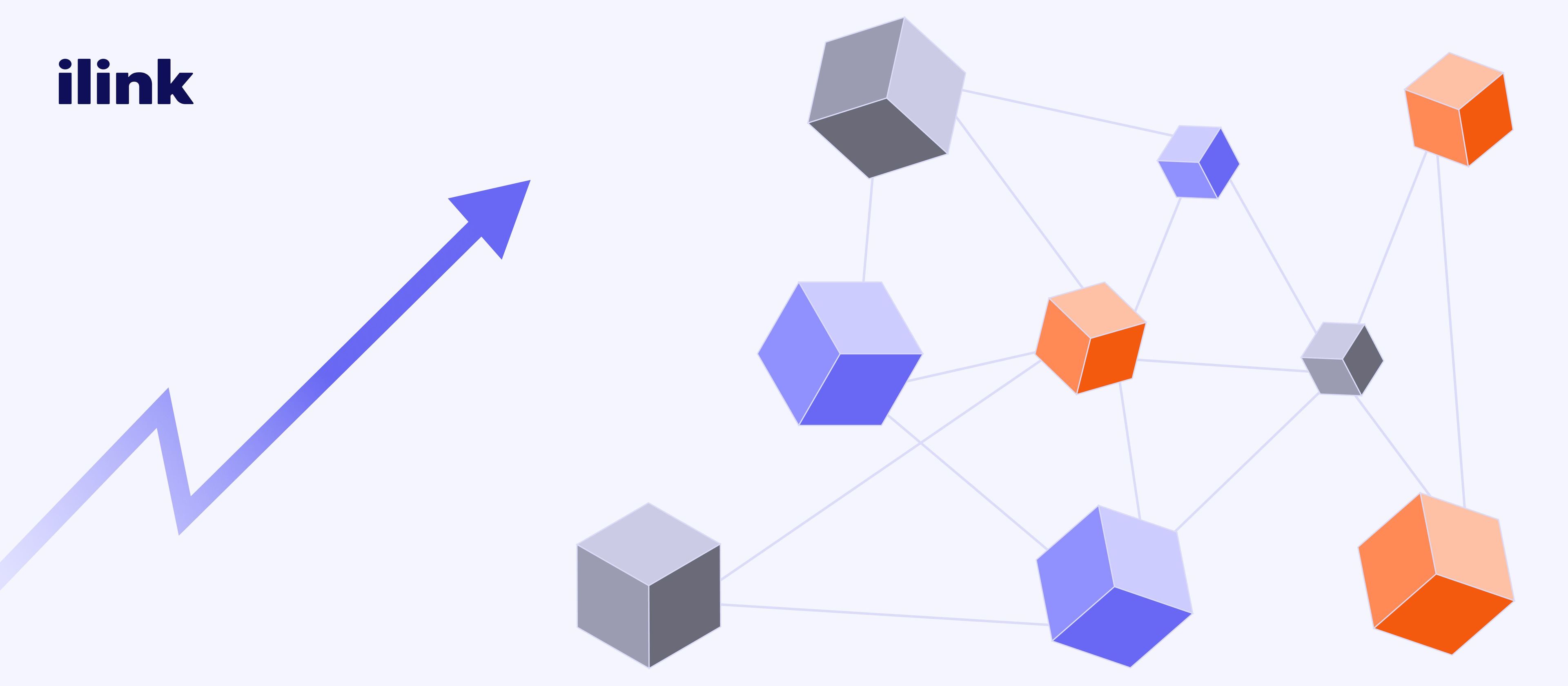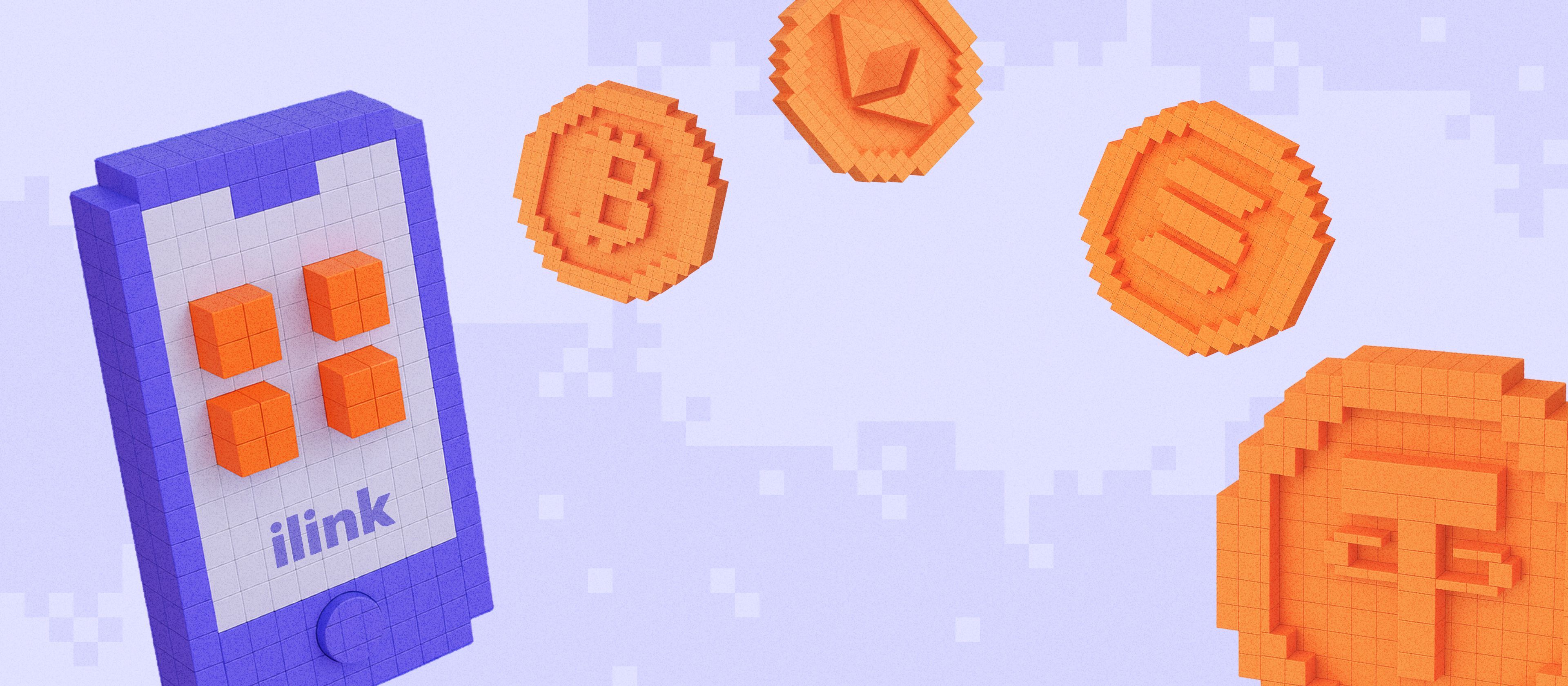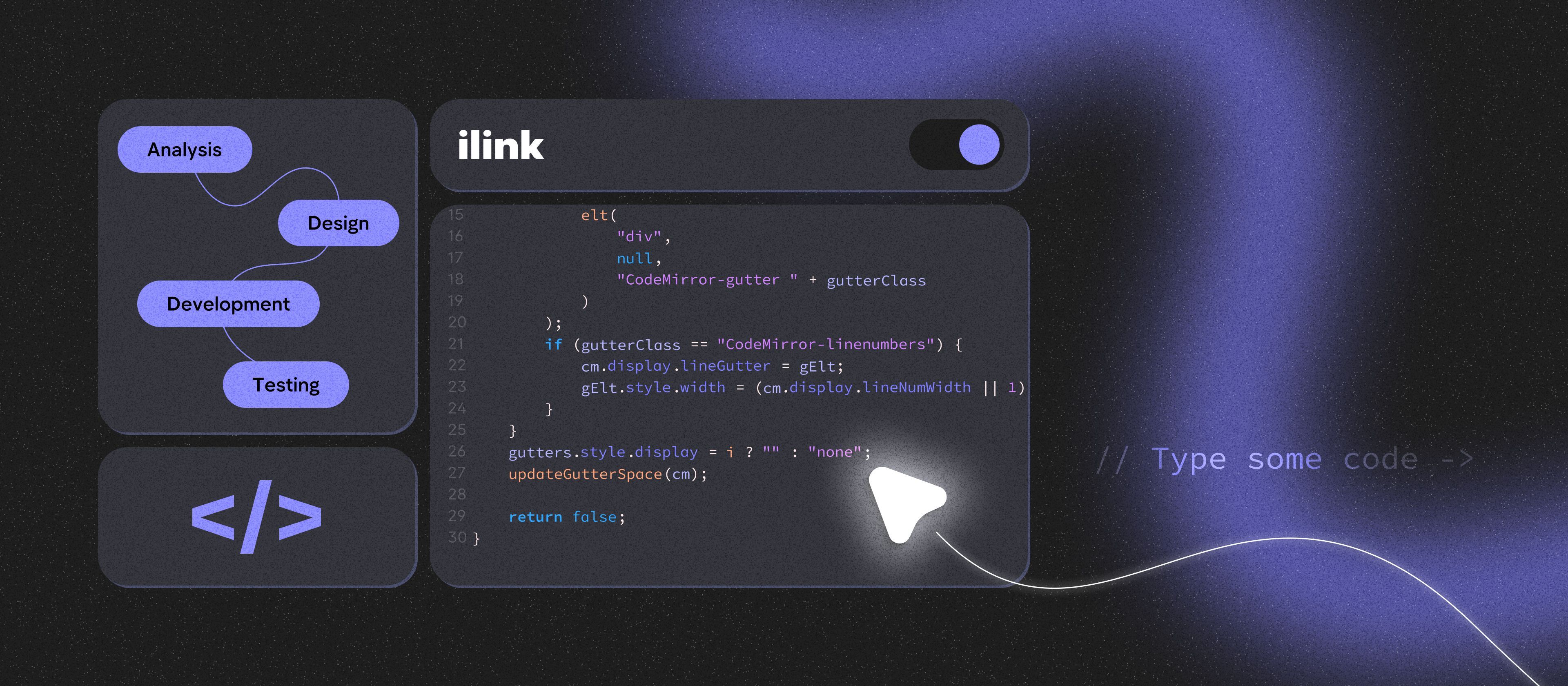Using Blockchain in Retail
Global Blockchain in the Retail Market
The global blockchain in the Retail Market reached a value of $8.4 billion in 2023, marking the beginning of a transformative journey for the retail sector. Looking ahead, this market is projected to grow to US$ 70,05 billion by 2030, exhibiting an impressive CAGR of 42.4% during the 2023-2030 period. This rapid expansion highlights the growing adoption of blockchain technology in retail, driven by its potential to improve supply chains, secure transactions, and enhance the customer experience.

Blockchain Applications in Retail
Blockchain technology is revolutionizing the retail sector by providing innovative solutions to longstanding challenges. From enhancing supply chain transparency to securing transactions, blockchain for retail offers a wide range of applications that improve efficiency, security, and customer trust. Below are some of the key blockchain applications for retail operations that are shaping the future of the industry.
- Supply chain transparency. Track products from manufacturing to delivery, ensuring retail traceability and product authenticity.
- Inventory management. Use blockchain for inventory management to optimize stock levels, reduce waste, and prevent out-of-stock situations.
- Loyalty programs. Implement secure, fraud-resistant blockchain-powered retail innovation to enhance customer loyalty programs.
- Retail payments. Utilize blockchain-based retail payment systems for faster, more secure transactions.
- Smart contracts. Automate retail operations with smart contracts in retail transactions, streamlining agreements and reducing disputes.
- Fraud prevention. Strengthen data security with retail blockchain solutions, minimizing fraud and ensuring secure transactions.
- Retail logistics. Optimize delivery and tracking systems with blockchain for retail logistics, improving overall efficiency.
This list highlights the key blockchain applications for retail operations that can transform the industry.
How Blockchain Improves Retail
The benefits of blockchain in retail are substantial, leading to improvements across several key areas.
1. Reduced Costs. By implementing blockchain for retail efficiency, retailers can cut down on unnecessary intermediaries and reduce overhead costs associated with manual processes, all while optimizing inventory and delivery through blockchain applications for retail operations.
2. Faster Payments. Blockchain-based retail payment systems allow for faster and more secure transactions, both for businesses and customers. These payment systems streamline operations and reduce the need for third-party verification, which can significantly speed up transaction times and lower costs.
3. Increased Transparency. The ability to track products through the supply chain promotes supply chain transparency with blockchain, leading to greater accountability and reducing the risk of counterfeits. Retailers benefit from blockchain for retail product authenticity, ensuring that customers receive genuine products, thereby enhancing brand trust.
4. Improved Security. One of the standout features of blockchain for retail is its security. By using distributed ledger technology, blockchain ensures that sensitive data is protected from tampering or fraud. This leads to enhanced retail data security with blockchain, safeguarding customer and business information.
Ready to leverage the power of blockchain for your retail business? Start exploring blockchain solutions tailored to your needs today. Improve your supply chain, reduce costs, and secure your transactions with advanced blockchain technology. Contact us to learn more about how you can benefit from blockchain's innovative capabilities!
How Does Blockchain Affect the Retail Supply Chain?
Blockchain has a transformative impact on the retail supply chain by introducing enhanced visibility, traceability, and trust. Through retail logistics on the blockchain, every step in the supply chain is recorded on an immutable digital ledger, ensuring supply chain transparency from the raw material stage to the final consumer. This visibility allows retailers to trace the entire journey of their products in real time, ensuring retail product authenticity and reducing the risk of counterfeit goods entering the market.
In addition, blockchain enables retail supply chain automation through smart contracts, which automatically execute agreements between manufacturers, suppliers, and retailers. This reduces manual errors, speeds up processes, and improves coordination across the supply chain. Blockchain also helps identify bottlenecks and inefficiencies, improve overall retail traceability, and help retailers resolve issues such as shipment delays or discrepancies quickly.
For example, major retailers like Walmart have implemented blockchain to track food products from farm to store. By scanning a QR code, Walmart can trace the origin of a food item in seconds, ensuring retail product authenticity and reducing the risk of contamination or counterfeit goods. This real-time tracking helps improve food safety while building trust with consumers.
Another example is the luxury fashion industry, where brands like Louis Vuitton use blockchain to verify the authenticity of their products. Each item has a unique digital certificate stored on a blockchain, ensuring that customers can trace the product's history and verify its legitimacy, thus protecting against counterfeit goods.
By offering these capabilities, blockchain not only improves operational efficiency but also strengthens consumer trust in the authenticity and quality of products, ultimately enhancing the reputation and reliability of the retailer.
How Big Is the Blockchain Retail Market?
As of 2023, the global blockchain in the retail market reached US$ 570.0 Million, and it is set to grow exponentially. With a projected value of US$ 15,969.6 Million by 2032 and a CAGR of 43.5%, the market potential for blockchain in retail is vast. As more retailers adopt this technology, the industry will see enhanced efficiencies, cost reductions, and more vital consumer trust.
The Potential of Blockchain in the Retail Market
The potential for blockchain in retail lies in its ability to solve longstanding challenges like counterfeiting, payment fraud, and inefficient supply chains. Blockchain retail solutions offer retailers new ways to build trust with their customers, provide retail supply chain automation, and create more efficient operations through smart contracts in retail transactions.
Challenges of Blockchain in Retail
Despite its potential, blockchain for retail faces challenges such as high initial implementation costs, integration with existing systems, and the need for regulatory clarity. Retailers need to balance these factors against the long-term benefits of blockchain in creating secure retail transactions and improving retail traceability.
FAQ
What is retail?
Retail involves the sale of goods and services directly to consumers. It encompasses everything from brick-and-mortar stores to online shopping platforms, forming a vital part of the global economy.
How does Blockchain work?
Blockchain is a decentralized digital ledger that records transactions across multiple computers in a way that ensures data integrity and security. Once information is added to the blockchain, it cannot be altered, making it ideal for secure transactions and retail product authenticity.
What is blockchain in B2B?
In B2B (business-to-business) contexts, blockchain technology is used to streamline transactions, enhance trust, and secure sensitive information. Blockchain for retail is increasingly being adopted in B2B supply chains, ensuring transparency and efficiency in retail logistics on the blockchain.
How is Blockchain Used in Retail?
Blockchain is used in retail for various purposes, including blockchain for inventory management, ensuring retail supply chain transparency, securing payments, and verifying product authenticity. It helps retailers create decentralized retail systems that improve operational efficiency and customer trust.
Comments (0)
Latest Posts
When a business should create own cryptocurrency? In this article, we'll discuss the types of cryptocurrency, how to launch, and where crypto generates the most income.
Why businesses need custom web solutions designed for growth - From profitable SaaS platforms to fintech and marketplaces.
Do You Have any Questions?
Leave your details - we will contact you to answer all your questions




